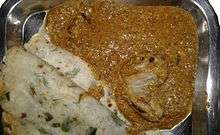Baingan bharta
_Bharta.jpg) | |
| Associated national cuisine | Bangladesh, India, Pakistan |
|---|---|
| Main ingredients | Eggplant, with onions, tomatoes and spices |
|
| |
Baingan bharta (mashed eggplant) is a South Asian dish, that originated in Punjab, bearing a resemblance to baba ghanoush. Baingan bharta is a part of the national cuisines of India, Pakistan, and Bangladesh. It is primarily a vegetarian dish that is prepared by mincing eggplant (baingan) that is grilled over charcoal or direct fire. This infuses the dish with smoky flavour. The smoked and mashed eggplant is then mixed with fresh cilantro (coriander leaves), chili pepper, onion and mustard oil.[1] Traditionally, the dish is often eaten with an Indian flatbread (specifically roti or paratha) and is also served with rice or raita, a yogurt salad. In states such as Bihar and U.P. it is served hot with a famous dish called as "Litti."
In Pakistan and Bangladesh, baingan bharta is part of popular cuisine, while in India, it is part of the cuisines of many states, including Karnataka, Bihar, Maharashtra, Punjab, and West Bengal.
Names
The dish has several regional names, such as: baingan ka bhurtha (Hindi: बैंगन का भरता, Urdu: بینگن کا بھرتہ), baingan da bhurtha (Punjabi), pura begena chatoni (Assamese: পুৰা বেঙেনা চাটনি), wangyacha bharit (Marathi: वांग्याचं भरीत), ennegayi (Kannada: ಎಣ್ಣೆಗಾಯಿ), begun bhôrta (Bengali: বেগুন ভর্তা, and olo (Gujarati).
Variants
In Karnataka, it is called eṇṇegāyi and prepared by boiling and frying whole eggplant usually served with akki rotti. In the South Indian state of Tamil Nadu, the Tamils prepare a similar dish called kathrikai thayir kothsu, in which the eggplant is cooked, mashed, and sautéed with mustard, red chilis and sesame oil. The final step in the recipe involves adding yogurt (Anglo-Indian curd) to the mixture and dressing the dish with coriander leaves.
In the Bhoj-Puri-speaking region such as the eastern part of Uttar Pradesh and west Bihar, it is known as baigan ka chokha; it also popular within the Caribbean Indo-community such as Trinidad, Suriname, and Guyana where descendants of indentured labourers from northern India live.
In Maharashtra, especially in northern parts known as Khandesh, vangyache bharit as they call it is served in social gatherings including wedding ceremonies. During harvest season, special "bharit party" is organised. Bharit is usually served with puri. In Vidarbha and Khandesh regions of Maharashtra, two variants are popular: kachha (raw) bharit and phodni cha (with tadka) bharit. In kachha bharit, all the ingredients except eggplant are used uncooked. Raw spring onion, tomato, green chillies, green coriander, and sometimes fresh fenugreek leaves are mixed with flame-roasted eggplant along with raw linseed oil or peanut oil. In phodni cha bharit, above ingredients are first fried in oil with spices and then mashed eggplants are mixed in it and cooked together. The similar process is followed in other Indian states and Pakistan with slight variations on ingredients. In Vidarbha and Khandesh, it is considered a delicacy when eggplants are roasted on a dried cotton plant stems which gives a distinct smokey flavour to the dish. The dish is served with dal, bhakri, and rice.
Eggplant is popular in Afghanistan in the form of a traditional salad called "bonjan salad", which is usually served at room temperature (or cold) together with main dishes. The dish is served with a variety of breads and is similar to another Afghani dish called baingan ka raita (Urdu: بینگن کا رائتہ ).


 Litti chokha, litti with baigan bharta, a North Indian dish
Litti chokha, litti with baigan bharta, a North Indian dish- Baigan bharta made in Nagpur, Maharashtra
 Akki rotti with eṇṇegāyi, a Karnataka dish
Akki rotti with eṇṇegāyi, a Karnataka dish
Protest symbol
In a protest against BT Brinjal and the introduction of genetically modified crops, volunteers from Greenpeace and Delhi's Le Méridien hotel cooked 342 kilograms (754 lb) of organic brinjal bharta at Dilli Haat, New Delhi, on 6 September 2011. This set a world record for the largest amount of the dish produced in one occasion of preparation. A portion of the final dish was sent to the Indian Prime Minister, Manmohan Singh's residence, accompanied by a letter of protest containing an explanation.[2][3]
See also
References
- ↑ Jaffrey, M. – World of the East Vegetarian Cooking – Knopf (1983) ISBN 0-394-40271-5
- ↑ "Protesters say no to BT Brinjal in a unique way". Hindustan Times. 6 September 2011. Archived from the original on 3 January 2013.
- ↑ "Giant Baigan ka Bharta makes for a delicious record". The Times of India. 7 September 2011.




